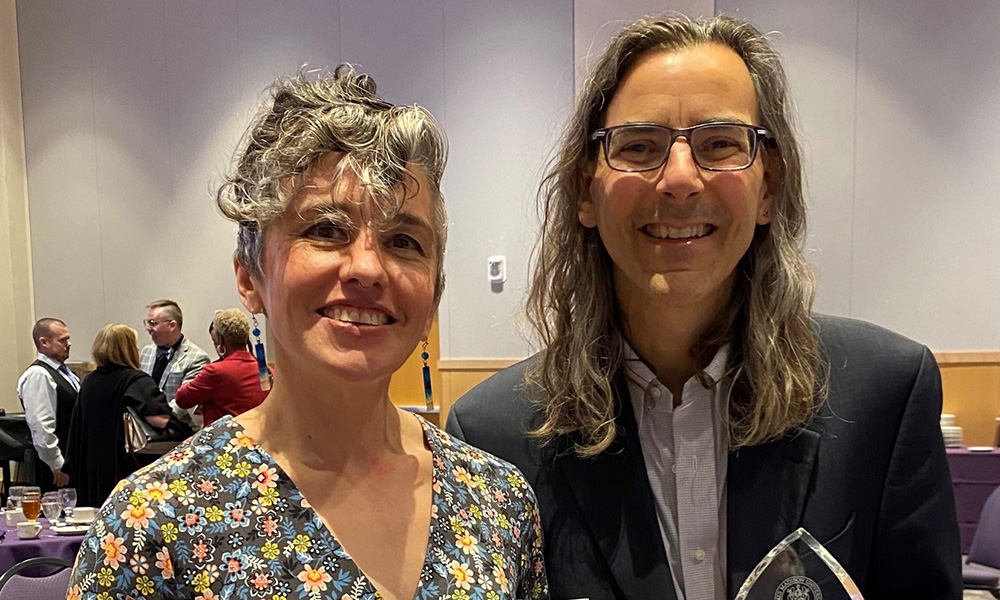CSPA learning improvements recognized with Provost Award
College of Health and Behavioral Studies
The College Student Personnel Administration program, housed in the Graduate Psychology department in the College of Health and Behavioral Studies, prepares future leaders in university student affairs.
This program was recently awarded the Provost Award for Learning Improvement, which recognizes programs for “their work in assessment, emphasizing integration of assessment into learning improvement efforts,” according to the website for the Center for Assessment and Research Studies, which identifies recipients of the annual award.
CSPA has had two major changes over the last few years, including updates to the curriculum and hiring a dedicated program director whose is responsible for leading the program.
Cara Meixner, professor of Graduate Psychology, served as interim program director for the 2022-23 school year, and worked with faculty, staff, and students to assess the program and design changes to the curriculum, which have fostered an improved learning experience for students.
Steve Grande stepped into the CSPA program director position following Meixner’s interim term. Previously, the program was partially led by Donna Harper, vice president of Access and Enrollment Management.
“The program had external program directors,” Meixner said. “Donna Harper selflessly served in that role for many, many years, often in partnership with another person.” Leaders from the Division of Student Affairs worked diligently to support the program, despite this being outside of their usual roles and responsibilities.
“The program would not be able to function without Student Affairs,” Meixner said, “because the students who are in the program are aspiring to be student affairs professionals. They are really generous and thoughtful partners.”
While working as interim program director, Meixner utilized surveys, reviews, and assessments to better align the capstone portfolio, the culminating project for the program, with its classroom curriculum.
“I spent the summer of 2022 talking to students and faculty and staff,” said Meixner, about the process of analyzing the curriculum and portfolio project. “I asked the faculty to look at their current curriculums and map them to our program objectives. I wanted to see where we were over-appealing to some objectives and where we were missing the mark.”
“One of the components of the portfolio has students develop a training plan or workshop that reflects a counseling theory and teaches a counseling technique,” Meixner said. “In the past, that section was really abstract for our students.”
“In the revision, we grounded the assignment,” Meixner said. Students are assigned a scenario where they must prepare materials and a presentation for a 60-minute workshops on counseling techniques to student affairs practitioners who don’t have counseling backgrounds.
“An outcome is that they have a job talk they can do when they go to a campus to interview,” Meixner said. These types of assignments, along with aligning with the competencies of the program, prepare students to enter the job market after graduation.
Additionally, Meixner went through data to determine ways the program’s culminating project, a portfolio of student work and experiences, could best prepare graduates to enter the workforce prepared for jobs in student affairs programs.
“One of the good takeaways [of the portfolio project] for the students it that it gave them an opportunity to think about experiences they had that were really salient to them,” Meixner said. “These are now talking points that they can bring up in job interviews.”
“Another thing we did was host an all-day portfolio boot camp,” Meixner said. “It was before the semester had started. It was a space for students to sit with each other and work on their portfolios and get support from the faculty.” Nearly all students in the program attended this workshop.
After the Fall 2023 semester began, students were presented with the opportunity to use the new portfolio criteria or the previously used criteria.
“None of them took the old,” Meixner said. She and other CSPA faculty were surprised at this, since some students had already started working under the old criteria. Meixner said that students shared they thought “this new portfolio is going to mean more and make more of a difference in the job acquisition process.”
Prior to her role as interim program director, Meixner served as an assessment coordinator for the program, which gave her keen insight into what the successes and areas for improvement were within the program.
“After three cycles of serving as assessment coordinator, I felt myself really challenged by some of the patterns I was seeing and felt very motivated to make a change.”
“At the heart of these changes, it’s students in their exit interviews, helping us see that we could do better,” Meixner said. “I really feel like the award is for our students, our alumni in particular.”
